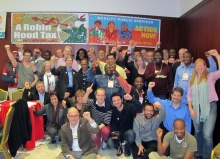Global trade strategy meeting

The meeting was called to analyse developments in the WTO’s agenda in the lead up to the 9th Ministerial Meeting of the WTO in Bali on 3-6 December. The main issues on the table at the Bali meeting include agriculture, trade facilitation and addressing least developed country issues. There is pressure to conclude the Doha round and end the impasse between the north and south so that more aggressive market access agreements can be progressed. A major tension in the summit will be between proposals put by developing countries (especially around agriculture and development) and the rich countries’ desire for trade measures that reduce red tape and harmonise regulatory issues. Complicating this process is the upcoming selection of a new WTO Director General who will take office a few months before the Ministerial meeting.
For PSI, the Bali Ministerial will be as important for what is set up post-Bali, should the Doha round of negotiations finally be concluded. This includes the proposed International Services Agreement (ISA) which is being championed by the most aggressively pro-trade countries as a plurilateral Free Trade Agreement (FTA). The ISA aims to shift the main objective of the provision of public services (currently provided by both public and private entities) away from serving the public interest to serving the profit interests of private foreign companies. The measures include liberalisation of investment in services, forcing governments to allow foreign competitive access to domestic public services and restricting governments’ ability to regulate services. The combination of these and other provisions will make privatisation almost non-reversible, promote deregulation and normalise the profit motive in many areas of public services beyond the current General Agreement on Trade in Services (GATS) provisions.
The proposed agreement on environmental goods is also of concern as it includes in its scope liberalisation of both environmental ‘goods’ and environmental ‘bads’.
Speakers at the OWNFS meeting acknowledged that the slow progress of the Doha round and the fragmenting of the trade agenda into bilateral FTAs has diluted civil society’s capacity for mobilising opposition; many NGOs have stopped trade work as it has become increasingly complex. The meeting recognised the need to rebuild momentum if we are to stop or slow the one-sided push to free trade in the interests of the corporations of the richest countries. The meeting:
- Shared information about WTO progress and country positions on various agreements
- Further defined the joint demands of the campaign
- Developed an action strategy for each of the proposed agreements or elements
- Organised on-the-ground activity around the Bali meeting and heard from the key Indonesian activist groups
PSI is also reviewing our engagement with the trade agenda; the meeting was a useful opportunity to make connections with civil society and country activists in the areas of most concern to us, particularly the ISA.

